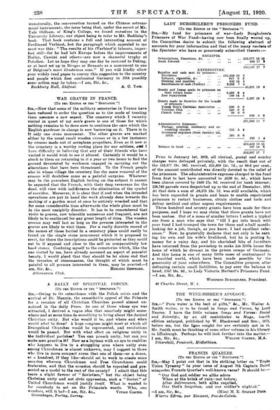WAR GRAVES IN FRANCE. (TO THE EDITOR Or THE "
SPECTATOR."]
Sm,—Now that some of the military oemeteries in France have been reduced to order the question as to the mode of treating them assumes a new aspect. The cemetery which I recently visited in quest of my eon's grave is one of those for which nothing remains to be done save to continue the care which the English gardener in charge is now bestowing on it. There is in it only one stone monument. The other graves are marked either by the usual small wooden crosses or in a few instances by crosses made out of aeroplane propellers. Even as it now is the cemetery is a worthy resting place for our soldiers, feed I have difficulty in believing that any of their friends who have visited it would wish to see it altered. Certainly it would be a shock to them on returning to it a year or two hence to find the ground devastated by workmen engaged in carrying out the alterations that have been threatened. To the French people also in whose village the cemetery lies the mere removal of the crosses will doubtless come as a painful surprise. Whatever may be the prevalent. English feeling on the subject it cannot be expected that the French, with their deep reverence for the dead, will view with indifference the elimination of the symbol of sacrifice. Moreover, it is clear that if and when the intended operations are put in hand the work already done towards the making of a garden must at once be entirely wrecked and that for some considerable time afterwards the whole place must be in the most unsightly disorder. It has to be remembered that visits to graves, now tolerably numerous and frequent, are not likely to be continued for .any great length of time. The wooden crosses may well last as long as the persons interested in the graves are likely to visit them. For a really durable record of the names of those buried in a cemetery place could easily be found on the single stone monument which it is proposed to erect, for there the inscriptions could be protected as they could not be if exposed and close to the soil on comparatively low head stones. Confining myself to the cemeteries which, like the one visited by me, have already assumed an aspect of peaceful beauty, I would plead that they should be let alone and that the invasion of stonemasons, -the thought of which must be painful to all persons interested in them, may be averted.—I


































 Previous page
Previous page